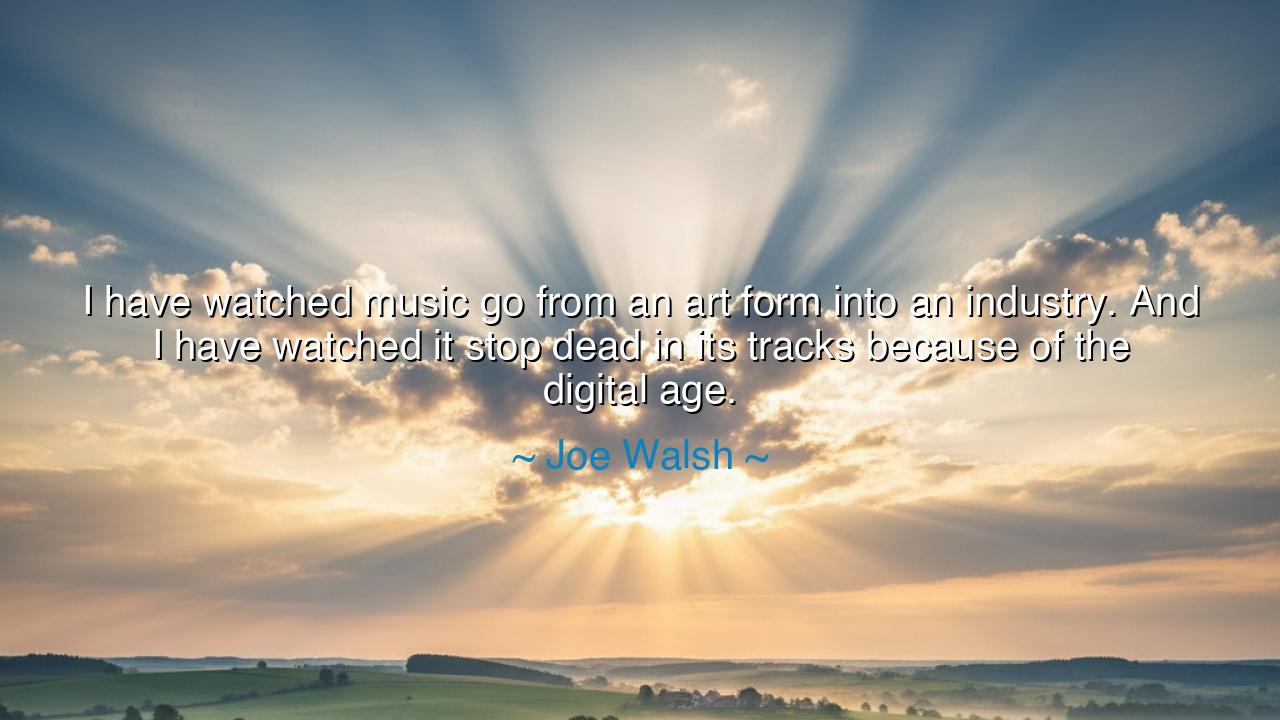
I have watched music go from an art form into an industry. And I
I have watched music go from an art form into an industry. And I have watched it stop dead in its tracks because of the digital age.






"I have watched music go from an art form into an industry. And I have watched it stop dead in its tracks because of the digital age." These words spoken by Joe Walsh capture the deep and complex evolution of music—how it transformed from a pure art form, a manifestation of creativity and expression, into a commodity, bound by the forces of commerce, technology, and industry. Walsh reflects on the profound shift that occurred as music became increasingly shaped by market demands, with its soul slowly being diluted by the cold, calculating influence of the digital age. The advent of digital technology brought about a revolution in the way music was produced, distributed, and consumed, but it also marked a significant loss—a loss of the intimate, human connection that once defined the art of music.
In ancient times, music was viewed as a divine gift, something that transcended the physical world and touched the souls of those who created and listened to it. The Greeks, for example, revered Apollo as the god of both music and prophecy, understanding that music had the power to both heal and inspire. It was seen not merely as entertainment, but as a form of spiritual and emotional expression. The lyre played by Orpheus was said to have the ability to move even the gods, illustrating the deep power music held. Music was sacred, an art form that connected the human and the divine, the earthly and the cosmic. Just as Joe Walsh laments, the purity of music was once a force that reached beyond the material world, but with the rise of the industry, that sacred nature has been tainted.
As Walsh observes, music’s transformation into an industry mirrors the wider shift in society itself, where the commercial aspect of art has often overshadowed its authenticity. The Renaissance, a period marked by a flourishing of art, literature, and music, was a time when artists were driven by a thirst for creative expression rather than profit. Ludovico Ariosto, the great poet of the Renaissance, did not create for the sake of monetary gain but out of a profound need to express human experiences through his epic poetry. This is the world Walsh reflects upon—a time when art, including music, was made for the sake of the soul, not for profit. The shift from such a purpose-driven creation to a more commercialized version marks a tragic diminishment of art’s sacred role in society.
The digital age that Walsh references represents a double-edged sword. On one hand, it democratized access to music, making it more widely available than ever before. Through streaming platforms, downloads, and social media, artists could reach global audiences with greater ease than the musicians of the past. But the rise of digital technologies also brought about the reduction of music into something that could be easily consumed, commodified, and marketed. The ease of sharing, the endless availability, and the monetary incentives behind the industry led to a focus on what would sell rather than what would speak to the soul. This marks the stagnation Walsh speaks of—music no longer grows and evolves in the same organic, expressive way it once did, but is often bound by trends and the demands of the market.
Consider the example of Beethoven, whose symphonies are regarded as some of the greatest artistic achievements of human history. Beethoven’s music was born from his inner struggle, his personal pain, and his deep connection to the world around him. His works were not created with the intention of pleasing the masses, but rather to give voice to his soul and to the complexities of the human condition. Music was a journey of the spirit, an exploration of the depth of human emotion. The world has not seen many figures like Beethoven, who were able to break free from the constraints of their time and create music for art’s sake rather than for commercial success. This is the essence of the loss Walsh speaks about—the inability of modern music to evolve in such a profound and transformative manner due to the overwhelming influence of the music industry.
The lesson from Walsh’s reflection is clear: as we move deeper into the digital age, we must not lose sight of the sacred nature of music and other forms of art. Just as the ancients believed in the transformative power of art, so too must we preserve that belief in the modern world. Technology can enhance the experience of music, but it should not replace the soul of the music itself. Artists must remain true to their creativity, their voice, and their purpose, even in a world that often prioritizes profits over passion. The challenge is to strike a balance between the convenience and accessibility that technology offers, and the authentic, soulful expression that music—at its core—embodies.
In practical terms, we should approach music, and all art, with intention and purpose. Just as Beethoven created without regard for the market, so too should artists today create with the goal of expression, not just consumption. We must also seek to be more mindful of how we consume music and support artists who remain committed to creating for the art itself. Let us not allow the digital age to dilute the sacredness of music, but instead, use technology to amplify the voices of those who truly have something to say. By doing so, we can help bring music back to its roots as an art form—one that speaks not just to the market, but to the soul.






AAdministratorAdministrator
Welcome, honored guests. Please leave a comment, we will respond soon